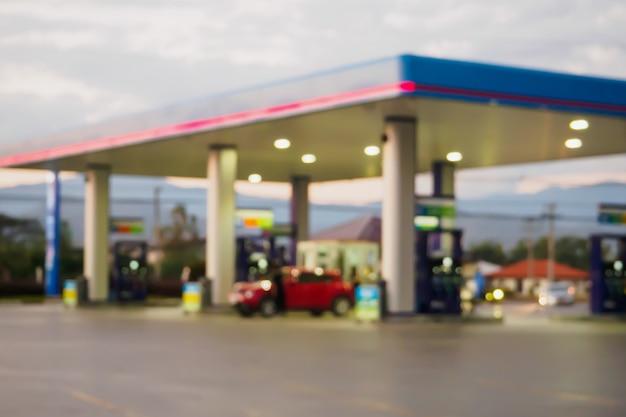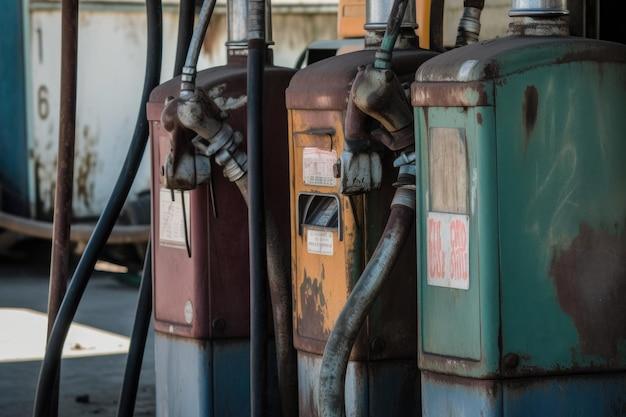Gasoline, the lifeblood of our vehicles, is something we rely on every day. We pull up to the gas station, fill up our tanks, and drive off without giving it a second thought. But have you ever wondered about the quality of the gas you’re putting into your car? Are all gas stations the same, or do some of them try to cut corners by watering down their gas?
In this blog post, we will delve into the intriguing world of gas stations and explore whether watered down gas is a real concern. We’ll answer questions like how water gets into gas station tanks, the potential consequences of using inferior gasoline, and whether premium gas is truly worth the extra cost. So buckle up and join us on this journey as we uncover the truth behind gas station fuel quality in 2023.

Do Some Gas Stations Water Down Their Gas
Have you ever wondered if the gas station you frequent isn’t being as honest as they should be? You pull up to the pump, fill up your car with what you hope is high-quality fuel, and drive off into the sunset. But is it possible that some gas stations are secretly watering down their gas? Let’s dive into this interesting topic and separate fact from fiction.
Gas Station Conspiracy or Urban Legend
Ah, the notorious gas station conspiracy theory. It’s a tale as old as time, passed down through generations of drivers who suspect foul play when it comes to the fuel they’re purchasing. But is there any truth to it? Well, the short answer is – not really.
The Myth Debunked
While it’s not unheard of for certain industries to cut corners and engage in questionable practices, the gas station realm is not one of them. It’s highly unlikely that gas stations are systematically diluting their fuel to save a buck. In fact, doing so would be considered illegal, not to mention putting their reputation and business at great risk.
Stringent Regulations: Keeping Gas Stations in Check
Gasoline quality is strictly regulated by the government to ensure consumer safety and protect the integrity of vehicles. Gas stations are subject to regular checks and inspections, both by local authorities and independent organizations. These inspections include examining the quality of fuel to ensure it meets the required standards. So, rest assured, the chances of encountering watered-down gas are incredibly slim.
Why the Myth Persists
So where does this urban legend stem from? Well, while there may be isolated incidents of dishonest practices, they are not representative of the industry as a whole. Moreover, issues like engine trouble or poor fuel efficiency are often misconstrued as signs of watered-down gas, when in reality, there can be a multitude of other reasons.
What You Can Do as a Consumer
While you can trust that gas stations are not diluting their fuel, it’s still important as a consumer to stay vigilant. Make sure you’re filling up at reputable stations that have a good track record. It’s also wise to monitor your vehicle’s performance regularly and address any concerns or issues promptly.
While the notion of gas stations watering down their gas may make for an intriguing tale, it’s ultimately nothing more than a myth. Gas stations are subject to strict regulations and inspections, making it highly unlikely they would risk their reputation and legal consequences for such practices. So, the next time you fuel up, you can do so with peace of mind, knowing that your vehicle is receiving the quality fuel it deserves. Happy driving!
Disclaimer: This blog post is for informational purposes only. Any views or opinions expressed are not representative of all gas stations and should not be taken as factual evidence.

FAQ: Do some gas stations water down their gas
Can dry gas harm your car
Dry gas, also known as fuel de-icer, is actually beneficial for your car rather than harmful. It helps remove small amounts of moisture that may have accumulated in your fuel tank. So, fear not! Your car will thank you for using dry gas during those icy winters.
How does water make its way into gas station tanks
Water can sneak into gas station tanks in a couple of ways. One way is through condensation, especially during humid weather. Another way is through underground water sources, such as high water tables or leaking pipes. However, reputable gas stations have safeguards in place to minimize water contamination.
What happens if you put 89 gas in an 87 car
No worries! If you accidentally pump 89 gas into your 87 car, it won’t cause any major issues. The difference between 87 and 89 octane gas is minimal, and most modern cars are designed to handle a range of octane levels. Your car’s engine will adapt and perform just fine.
Which gas is better: 87, 89, or 93
The best gas for your car depends on its specific requirements. Most vehicles run perfectly fine on regular 87 octane gas, while some high-performance or luxury cars may require higher octane levels like 89 or 93. Check your car’s manual or consult with a mechanic to determine the right choice for optimal performance.
What gas station offers the highest quality gas
The quest for the best gas station quality is like searching for the Holy Grail. While there are certainly reputable gas stations out there, the industry as a whole maintains strict quality standards. Well-known stations like Shell, Chevron, and BP are known for their commitment to quality, but ultimately, it’s the fuel additives and maintenance of individual stations that make a difference.
Do all gas stations source their gas from the same place
Believe it or not, gas stations don’t have a secret petrol commune where they all collect their fuel. Gasoline is supplied by multiple oil companies and distributed through a network of distributors. So, fear not, the fuel at your local station comes from a variety of sources, ensuring fair market competition.
What can watered-down gas do to your car
Water in your gas tank can cause a whole mess of problems. It can hinder the combustion process, leading to misfires, stalling, or reduced engine power. Additionally, water can cause corrosion in the fuel system, leading to expensive repairs. That’s why it’s vital to choose reputable gas stations that prioritize quality control.
Why do gas stations mix water with gasoline
Gas stations mixing water with gasoline? That sounds like a horrifying experiment gone wrong. In reality, mixing water with gasoline is not a common practice among gas stations. However, the presence of water in gas can sometimes occur due to condensation or other factors. The important thing is to be aware of this and diligently choose reputable gas stations.
How can you tell if a gas station has bad gas
Detecting bad gas can be a challenge, but there are some signs to watch out for. If your car experiences frequent stalling, rough idling, or sputtering, it could be a sign of contaminated fuel. Poor fuel efficiency or the sudden onset of engine issues can also indicate bad gas. In such cases, contact a mechanic to diagnose the problem.
Does premium gas last longer
Premium gas may sound fancy, but when it comes to longevity, it doesn’t have any superpowers. While it’s true that premium gas contains additional additives, these are primarily aimed at optimizing engine performance in high-compression engines. So, if your car doesn’t require premium gas, you’re not missing out on increased durability.
Are some gas stations known for offering better gas
Every gas station wants to claim they have the crème de la crème of fuel, but the reality is not so clear-cut. While larger, well-known gas stations often prioritize quality control, other smaller stations can also offer reliable fuel. It ultimately depends on the individual station’s diligence in maintaining their equipment, storing fuel properly, and adhering to industry standards.
Is premium gas really worth it
If your car doesn’t require premium gas, spending those extra cents per gallon may not be worth it in terms of performance or efficiency. Unless your vehicle specifically needs the higher octane levels, sticking with regular unleaded will do just fine. Save your money for something that truly makes a difference.
Does it matter where you get gas from
Yes and no. While it’s essential to choose reputable gas stations with a track record of quality, the “where” is less important than the “how.” Focus on finding stations that prioritize regular maintenance, cleanliness, and ensuring their fuel pumps and storage tanks are up to industry standards. Quality control matters more than the specific brand.
Which gas station offers the best 93 octane gas
For those seeking the crème de la crème of 93 octane gas, big names like Shell, Chevron, and BP are safe bets. These stations have a reputation for maintaining high-quality fuel across all octane levels. However, be sure to double-check with individual stations in your area to ensure they offer 93 octane gas.
Can Heet remove water from gas
Indeed! Heet is a popular fuel additive designed specifically to remove water from gas tanks. It works by binding with the water and allowing it to be burned off harmlessly during the combustion process. So, if you suspect water contamination, a splash of Heet can help clear things up.
Is BP or Shell gas better
Ah, the great gasolinian debate! Both BP and Shell are reputable companies known for their commitment to quality gas. While each may have its unique additives or marketing strategies, the overall quality is comparable. Choosing between the two ultimately boils down to personal preference, convenience, and station maintenance in your area.
Is 10-year-old gas still good
Ten-year-old gas? Yikes! It’s safe to say it has passed its expiration date. Gas typically begins to degrade after three to six months, and after ten years it would likely be too old and stale to be usable. Fuel efficiency and engine performance would suffer greatly, so it’s best to avoid using gasoline with such a long, dusty shelf life.
Is Shell gas actually better
Shell gas has established a reputation for quality over the years, but the difference between Shell and other reputable gas stations is not significant. All major gas stations, including Shell, Chevron, and BP, adhere to strict industry standards to ensure their fuel meets quality requirements. Rest assured, you’re not missing out if you happen to fill up at another well-maintained station.
Does cheaper gas equate to lower quality
In the world of gasoline, the price is not always indicative of quality. Cheaper gas doesn’t automatically mean it’s lower in quality. Some smaller or lesser-known stations may offer competitive prices while still meeting industry standards. The key is to focus on finding gas stations that consistently maintain their equipment and prioritize quality control.
Why are no-name gas stations cheaper
No-name gas stations often offer lower prices due to reduced overhead costs. These stations may not invest heavily in branding or flashy amenities, allowing them to offer competitive prices. While they may lack the name recognition of larger chains, many still meet industry standards and offer reliable fuel. It’s essential to balance price with reputation when choosing where to fuel up.
How much water in gas is considered bad
When it comes to water in gas, even a small amount can cause troubles. Ideally, there should be no water present in gasoline; any water content is considered undesirable. Even a small percentage of water can disrupt the combustion process, leading to engine performance issues. To keep your car running smoothly, choose gas stations that prioritize water prevention and quality control.
Get ready to fuel up with confidence and put those gas station myths to rest. Remember, choose reputable stations, keep an eye out for water contamination, and let your car roar with joy on the roads. Happy driving!